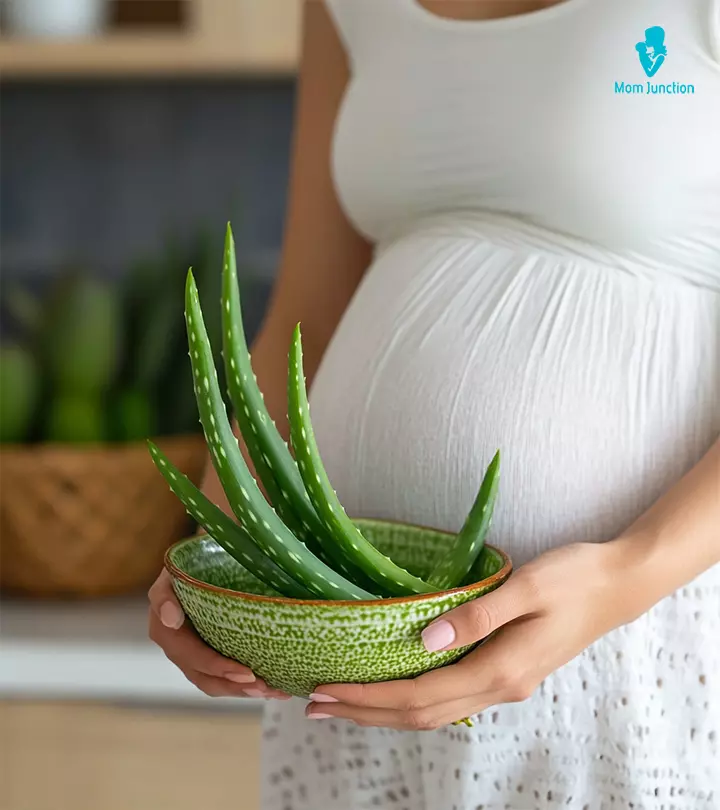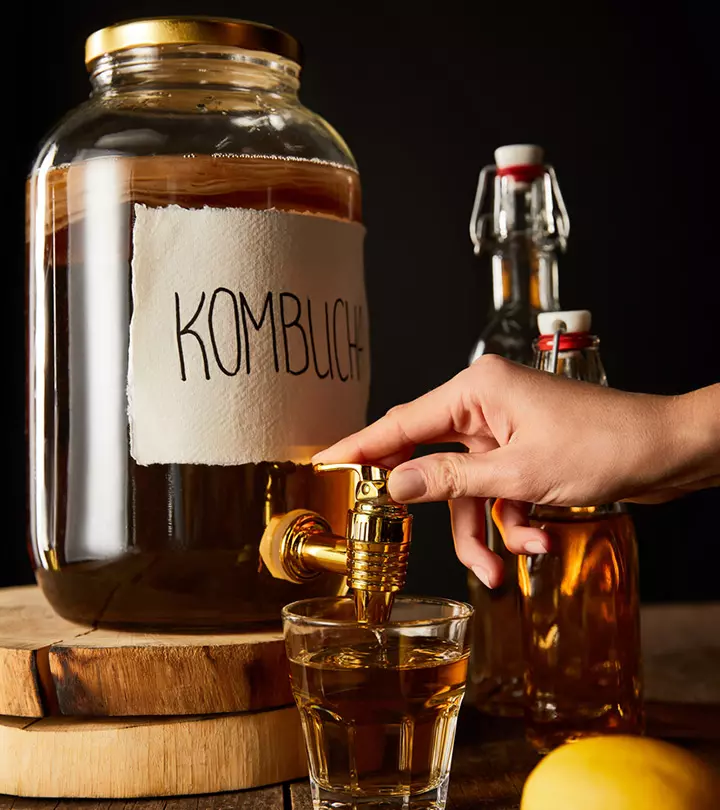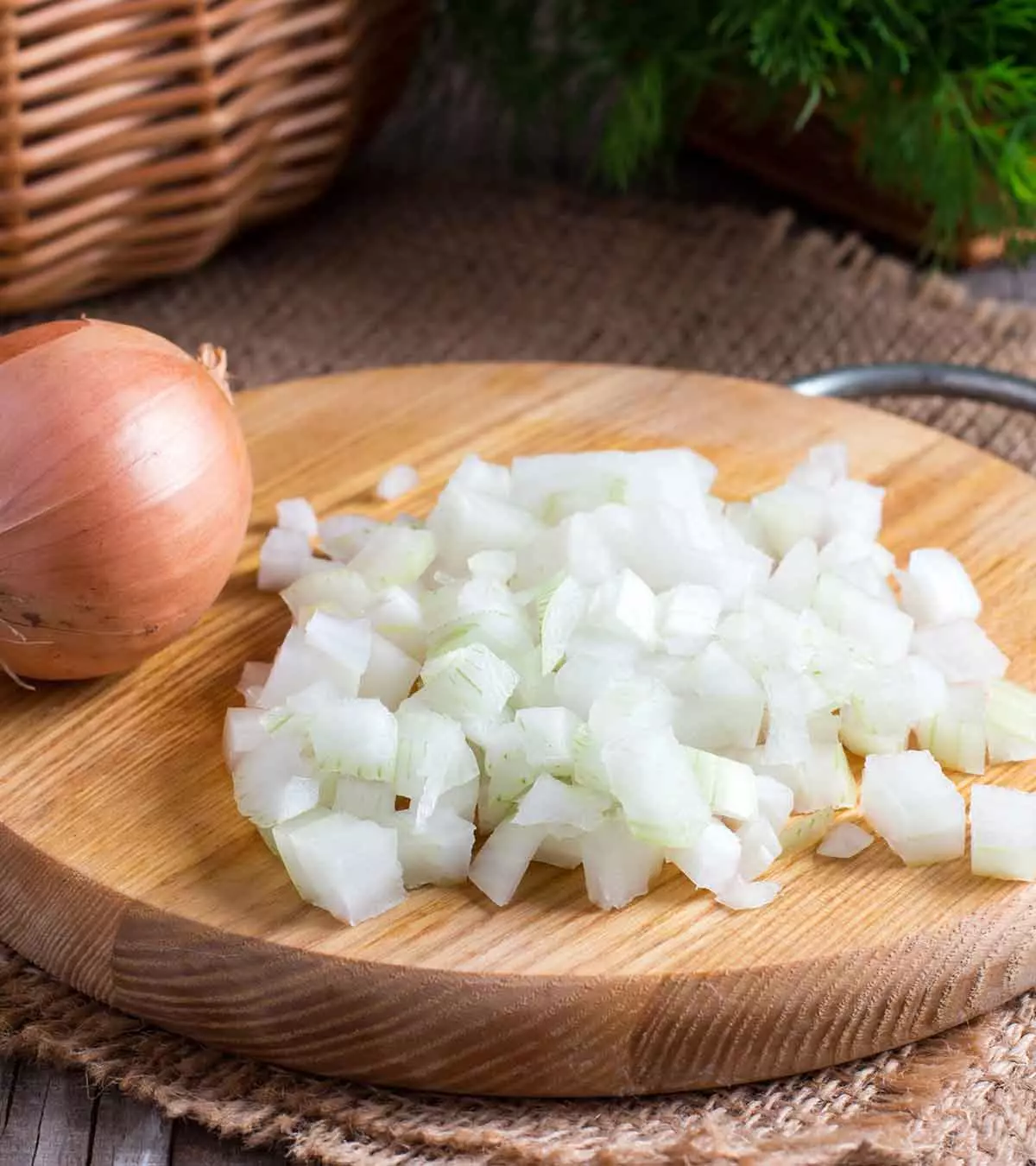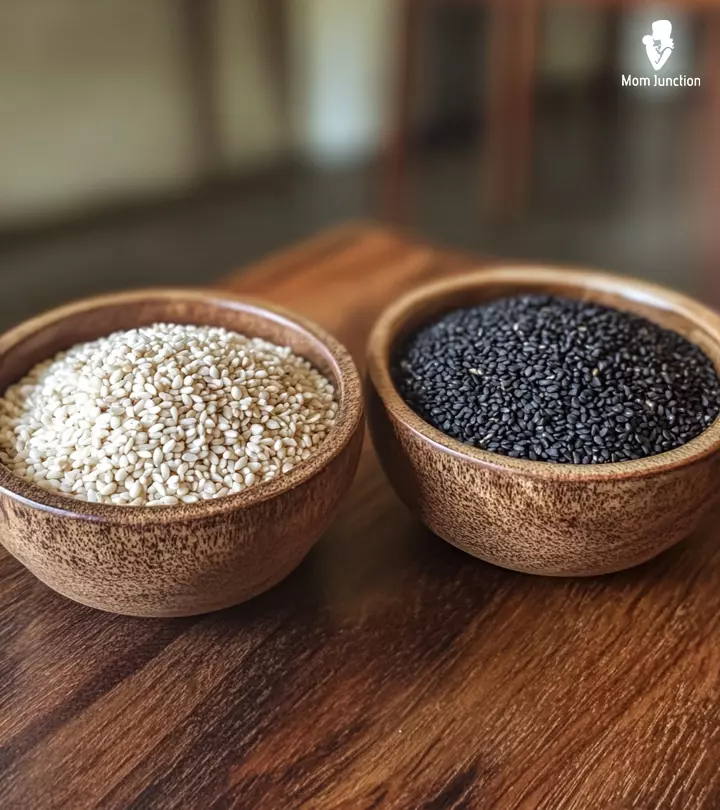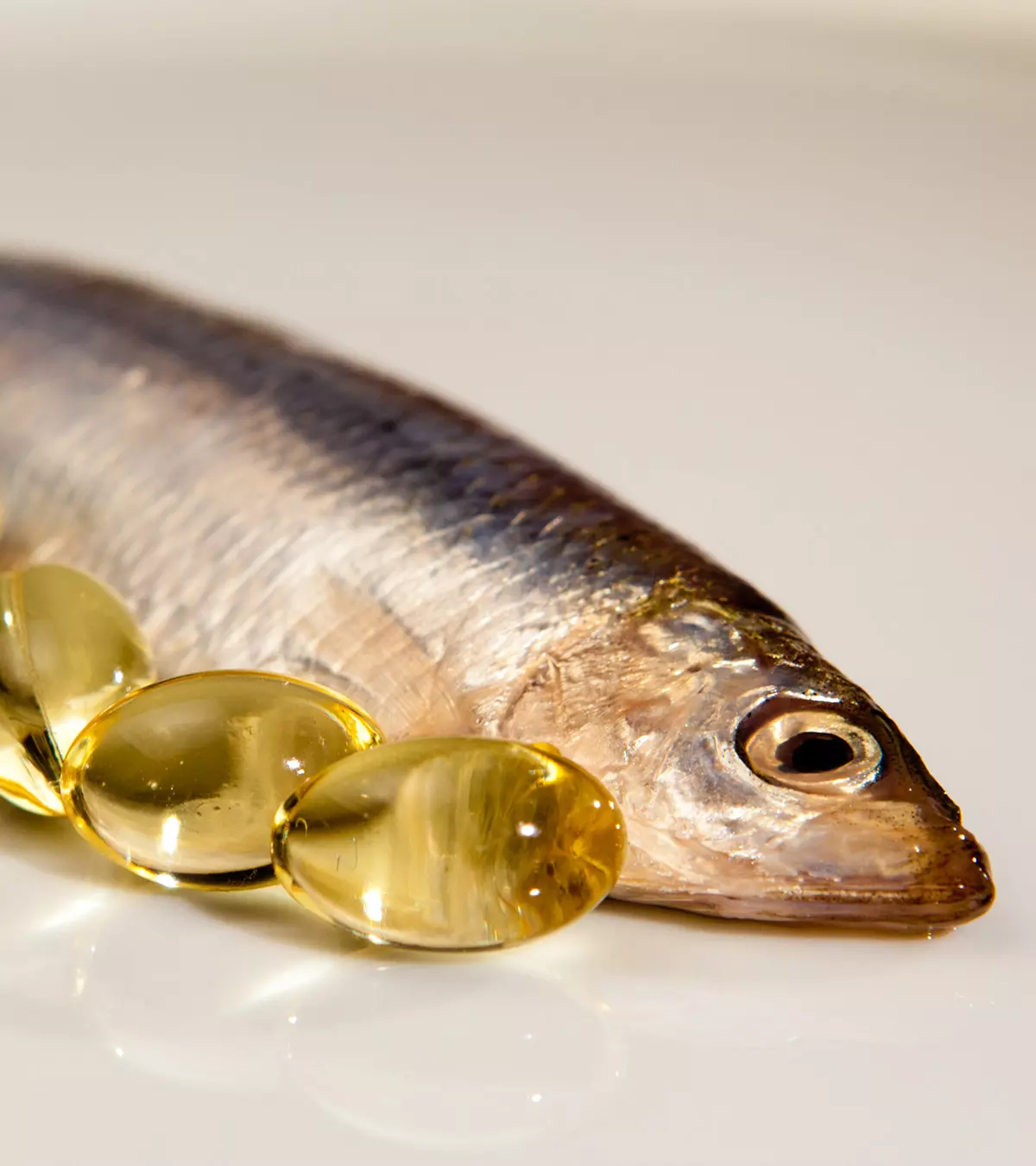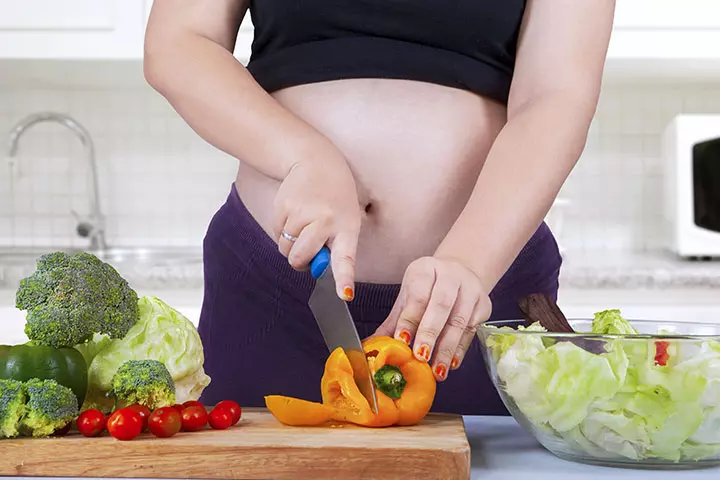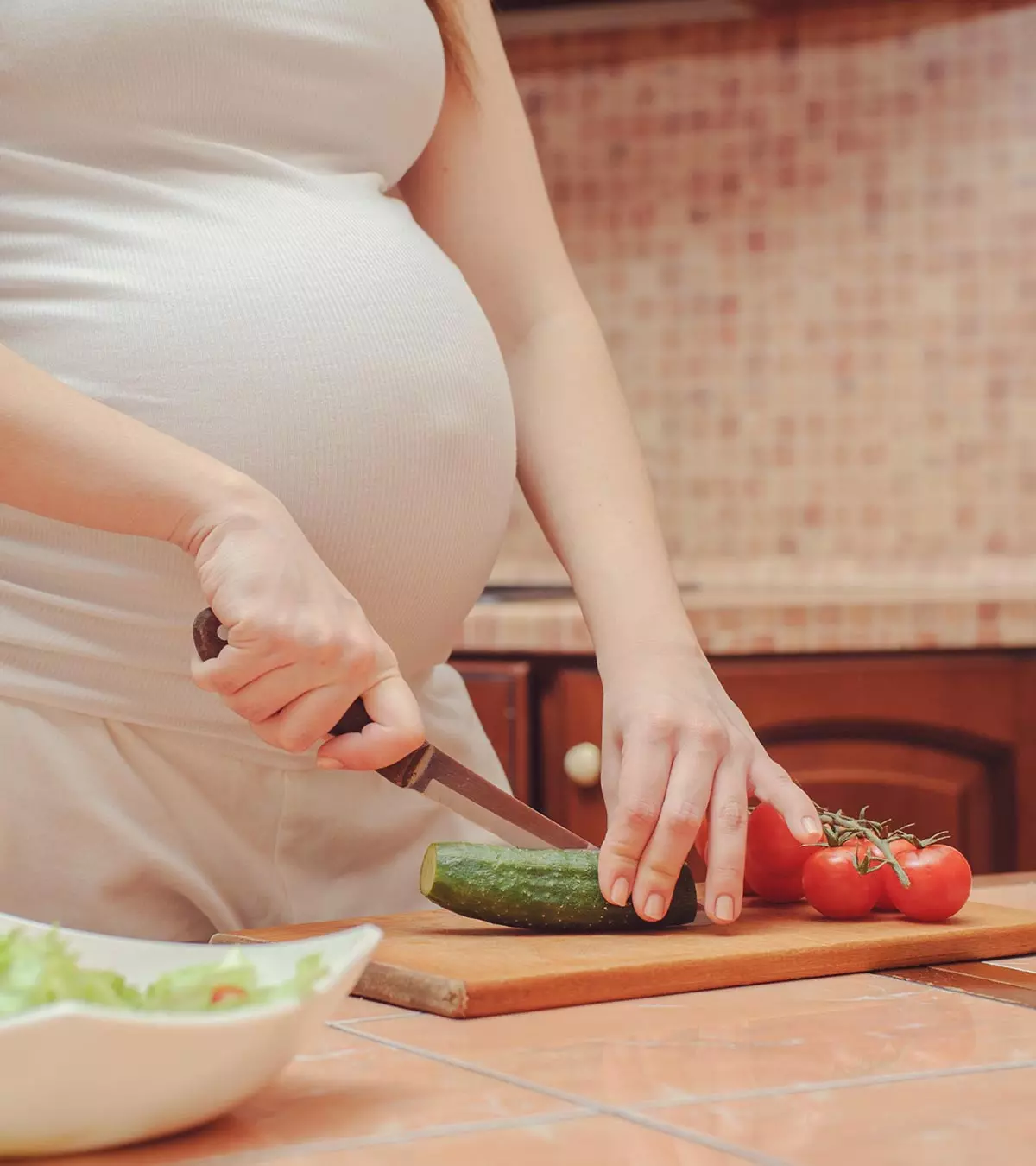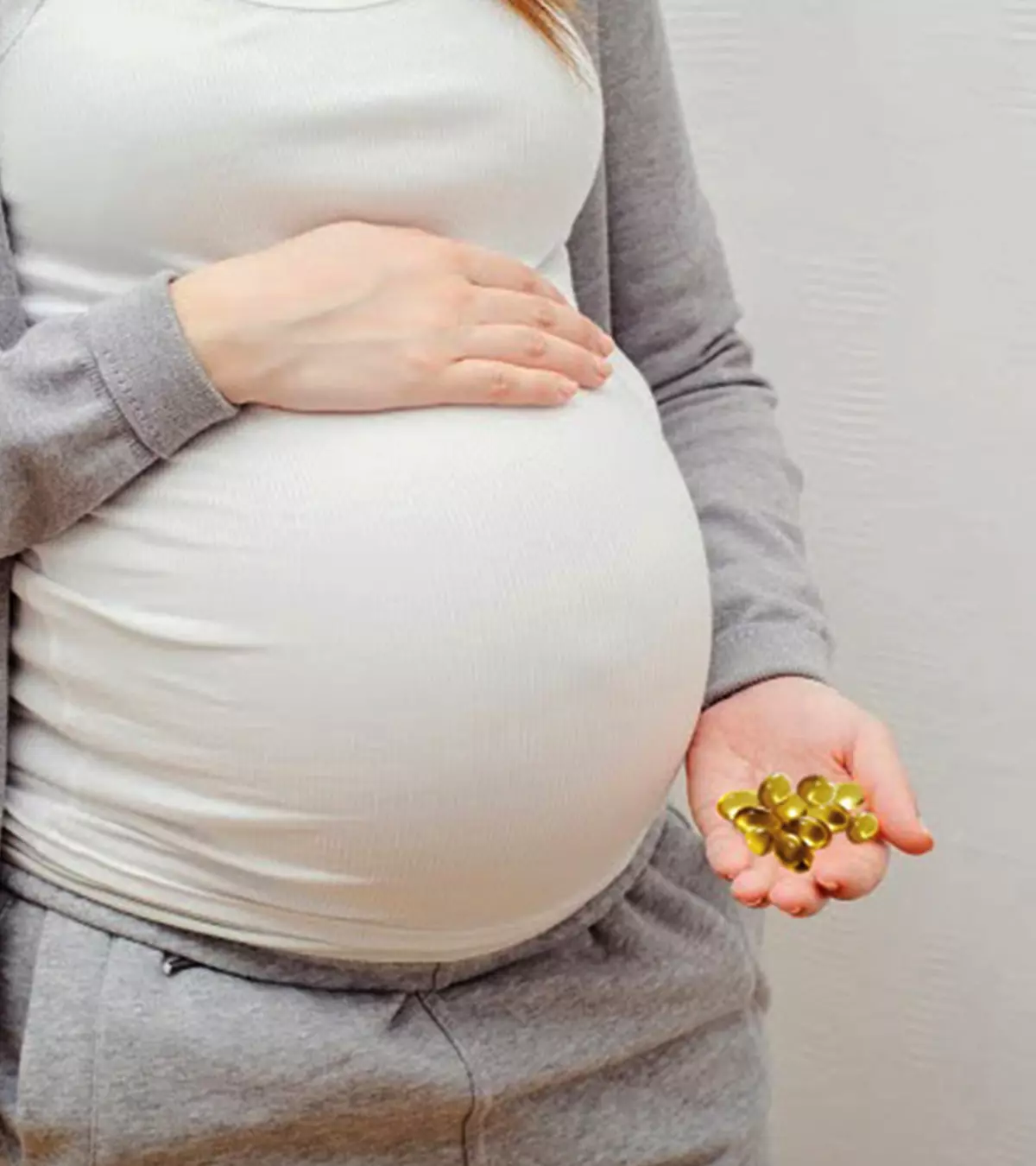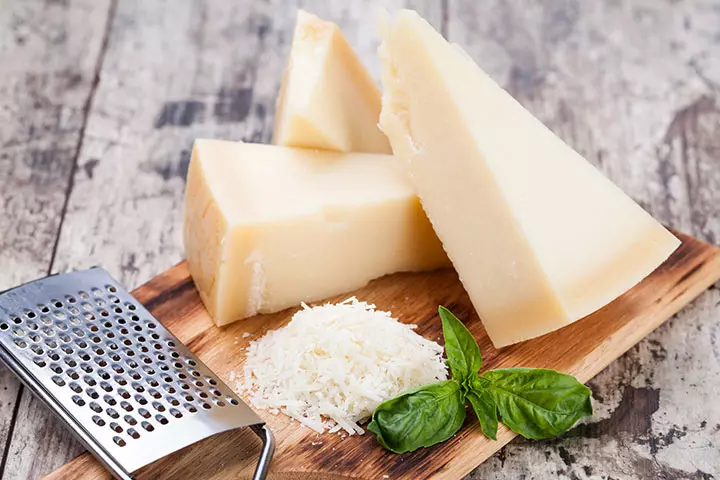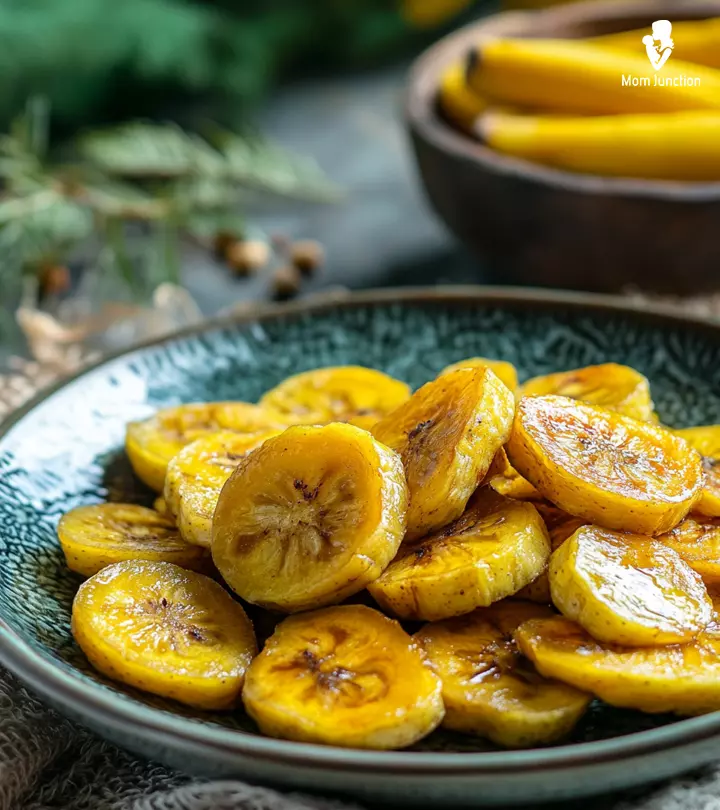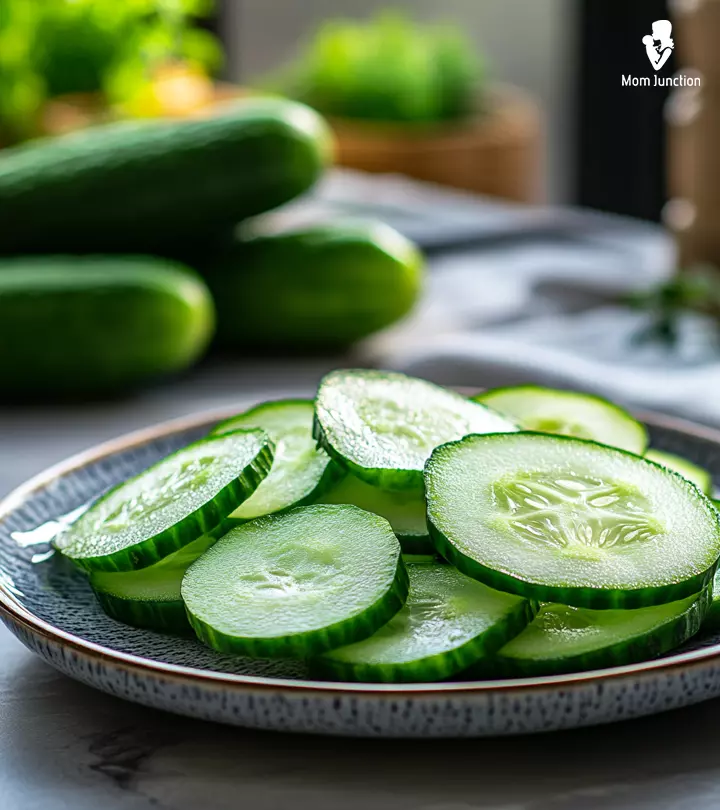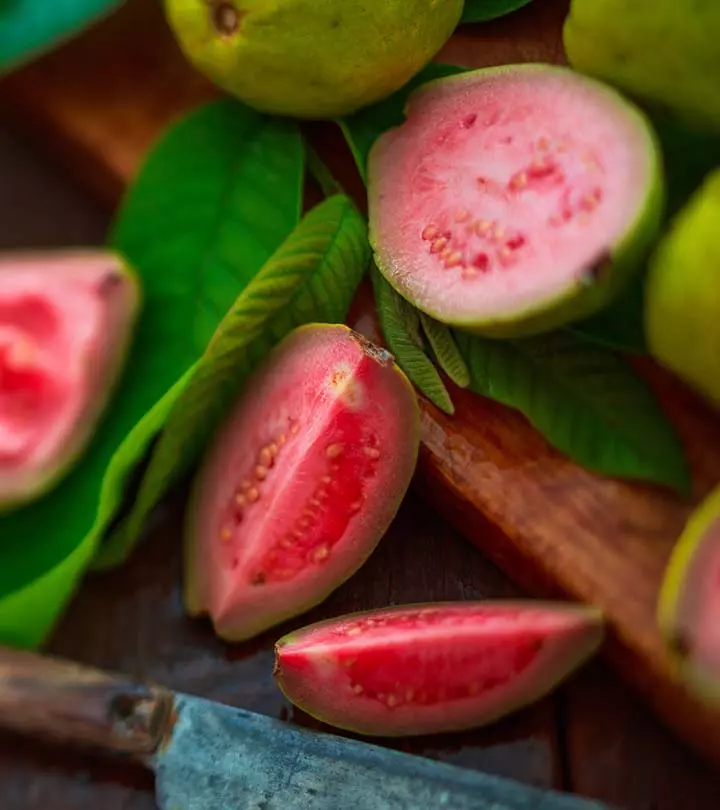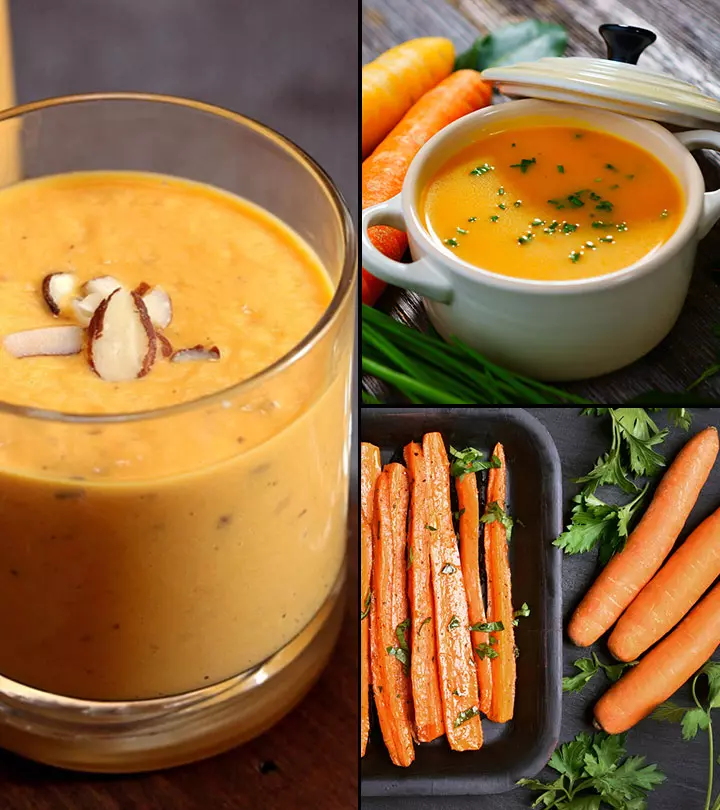
Image: MomJunction Design Team
Many moms look for carrot recipes for babies when introducing them to solids. Carrots are good sources of vitamin A, and they could benefit all the organs in the body. Although it is one of the best foods for weaning babies, consider introducing them to it in small quantities to ensure they are not allergic to it.

You may begin introducing this vegetable to them after six months. However, consult your pediatrician before you do so. Carrot puree, especially made from bigger carrots than baby carrots, is best recommended since the baby’s digestive system may not be able to digest fresh carrots.
Read on to understand the benefits of carrots and learn some easy, palatable carrot recipes for babies.
Key Pointers
- Carrots are safe for babies over six months; however, it is ideal to consult a pediatrician before introducing them.
- To support easy digestion in babies, serving fresh carrot puree is advisable.
- Carrots are rich in vitamin A and other essential nutrients crucial for good eye and heart health.
- The root vegetable also enhances immunity and improves liver and kidney function.
- However, it is important to choose unprocessed, fully grown carrots and wash and cook them well before serving them to babies.
When Can Babies Eat Carrots?
Carrots can be fed to infants from six months (1). The root vegetable is rich in nitrates, which is why the American Academy of Pediatrics advises against giving carrots to babies younger than three months (2). When feeding carrots to baby, stick to cooked carrots because raw carrots have a higher chance of triggering allergies. Chop the carrots finely to minimize choking risk (3). Once the little one is 12 months old you can give them sliced raw carrots as finger food.
As carrots are a treasure trove of nutrients, they benefit the baby in many ways.
Health Benefits Of Carrots For Babies
Carrots are rich in vitamins and several vital nutrients. Here’s how it supports various body functions.
- Good for the eyes: The beta-caroteneiA natural dye that gives color to fruits and vegetables and gets converted into vitamin A in the human body. present in it is a precursor to vitamin A that is essential for a healthy retina. And, healthy retinal cells lead to better vision.
 Quick fact
Quick fact- Leads to a healthy circulatory system: MicronutrientsiVitamins and minerals required by the body in trace amounts. such as flavonoidsiA group of naturally-occurring antioxidant and anti-inflammatory compounds found in plants and fruits. keep the heart and blood vessels healthy. They are also good for kidneys that purify blood to filter out toxins.
- Boosts immunity: A healthy immune system is essential for a developing baby. Research shows that regular consumption of carrots increases the number of lymphocytesiA type of white blood cell that forms the body’s immune system. and platelets – blood cells that aid in regulating immunity (3).
- Supports the functioning of the liver: Carrot shields the liver from the harmful effects of ingested toxic chemicals. Regular consumption of carrots keeps liver cells healthy.
- Benefits the general health of body cells: The root vegetable prevents uncontrolled cell growth and assists the existing cells in healing wounds.
Below is the total nutritional content in 100g of carrot.
Nutritional Value Per 100g Of Carrot
| Nutrient | Unit Value Per 100g |
|---|---|
| Energy | 41kcal |
| Carbohydrates | 9.58g |
| Natural sugars | 4.74g |
| Fiber | 2.8g |
| Protein | 0.93g |
| Fat | 0.24g |
| Calcium | 33mg |
| Iron | 0.3mg |
| Magnesium | 12mg |
| Phosphorus | 35mg |
| Potassium | 320mg |
| Sodium | 69mg |
| Manganese | 0.143mg |
| Copper | 0.045mg |
| Zinc | 0.24mg |
| Selenium | 0.1µg |
| Fluoride | 3.2µg |
| Vitamin C | 5.9mg |
| Vitamin B1 (Thiamin) | 0.066mg |
| Vitamin B2 (Riboflavin) | 0.058mg |
| Vitamin B3 (Niacin) | 0.983mg |
| Vitamin B5 (Pantothenic acid) | 0.273mg |
| Vitamin B6 | 0.138mg |
| Vitamin B9 (Folate) | 19µg |
| Choline | 8.8mg |
| Vitamin A | 835µg |
| Vitamin E | 0.66mg |
| Vitamin K | 13.2µg |
Source: United States Department of Agriculture (4)
How To Select And Store Carrots?
Select:
Choose carrots that have minimal blemishes and consistent color. If you observe any stem-like growth on the top, it suggests the carrot was harvested a long time ago, hence look for fresh ones. Do not buy those that have excessive hair-like roots, scaly surface growth, or puncture marks as they are likely to have been caused by pests. If possible, purchase organic carrots grown without pesticides because they contain less nitrates and have more beta-carotene, vitamin B1, iron, magnesium, and phosphorus than non-organic carrots (11).
Storage: After buying the carrots, peel a thin layer and slice away the hard, upper disc. Soak the carrots in water for five minutes to remove any soil particles. Soak for three more minutes if the first soak yields muddy water. Then wash the vegetables under running water by cleaning each carrot individually. Dry them with a kitchen towel and put in an airtight ziplock pouch for refrigeration. You can also chop the carrot into small cubes, place them in a bowl, and close the bowl with cling film before storing it in the refrigerator.
Baby Carrots Or Regular Carrots?
Baby carrots are harvested before they mature, which leaves them small or “baby” in size. Biologically, there is no difference between the two varieties and they have the same nutritional values. But, baby carrots are sweeter and tender than full-grown varieties.
There is an alternative variety, called baby-cut carrots, which are full-grown carrots cut longitudinally into long slices. They are cut into smaller pieces for easy cleaning and cooking and sold as frozen vegetables.
Baby carrots were found to have chlorine in them (5). They also have low nutritional value due to poor slicing methods of manufacturers, who chop away most of the nutrient-rich outer layers.
If you are buying carrots for babies, then buy regular, unprocessed, full-grown carrots that can be cleaned and cut at home.
How To Cook Carrots For Baby Food?
There are four ways to process the vegetable for baby food:
1. Steam:
Steaming is the best way to cook as it softens the carrot and retains all the nutrients. Here is how you steam carrots:
- Clean the carrots and dice them or cut them into long thin strips.
- Transfer the carrots to a steamer basket and place the basket in a deep pan with an inch of water.
- Steam the carrots at a medium flame for ten minutes or until the carrots are soft.
- You can also steam carrots in a pan with shallow water just enough to submerge them. Steam at low flame for ten minutes or more.
2. Boil:
All you need is a cooking pot or a pressure cooker. Do not throw the water away after boiling the carrots as the water is nutrient-rich. Instead, use it immediately to make carrot puree for the baby or something else. Here is how you boil carrots:
- Chop carrots to the desired size and put them in a cooking pot with water.
- Boil the carrots with a slightly closed lid on a medium flame for 20 minutes or till the carrots are completely soft.
- You can also use a pressure cooker and cook for three steam whistles.
- Sieve the carrots and use the nutrient-rich stock for other cooking purposes. Boiled carrots can be mashed and fed to the baby directly or can be used for recipes with other fruits and vegetables.
3. Bake:
Baking is ideal for thin and long slices or disc shapes, and doubles up as a baby’s finger food. You can also use them to garnish the puree. Following are the steps to bake carrots:
- Place the carrots on a baking tray greased with a bit of vegetable oil. If you want to avoid oil, then use a glass casserole dish where the vegetable does not stick to the dish.
- Preheat the oven to 350ºF (177ºC). Place the dish into the oven and bake for 40 minutes or until the carrots turn dark orange.
- Remove the baked carrots from the tray and let them cool before you serve.
4. Roast:
You can roast carrots since it requires a minimal amount of ingredients. Roasted carrots retain the crunchiness, which older infants might like. Here is how you roast carrots:
- Cut the carrots longitudinally or in large discs.
- Place them in a non-stick frying pan and cover the lid leaving a slight tilt for the steam to escape.
- Cook the carrots on a low flame for 30 minutes and cool and serve to the baby.
Carrots can be processed any of these ways to be made into several delicious homemade carrot baby food preparations.
Healthy Carrot Recipes For Babies
The following recipes are easy to prepare and are healthy for the growing baby.
1. Carrot puree:

This classic carrot baby food recipe is time and mom-tested for generations!
You will need:
- 3-4 cups of finely chopped carrots
- 6-7 cups of water
How to:
- Boil the carrots in a cooking pot or a pressure cooker until they are completely tender.
- Transfer the water and carrot into a blender, and blend to the desired consistency. The puree is ready.
- This recipe is ideal for six-month-old infants who have just switched to solid food. For younger babies, you can add extra water and blend the carrots for longer to get a thinner consistency.
 Did you know?
Did you know?2. Carrot and potato puree:

Potatoes are rich in carbohydrates and make an excellent accompaniment with carrots.
You will need:
- 3 cups finely chopped potatoes
- 3 cups finely chopped carrots
- 5-6 cups of water
How to:
- Boil the carrots and potatoes together until they are soft and tender.
- Transfer them to a food processor for the required consistency.
3. Sweet potato and carrot puree:
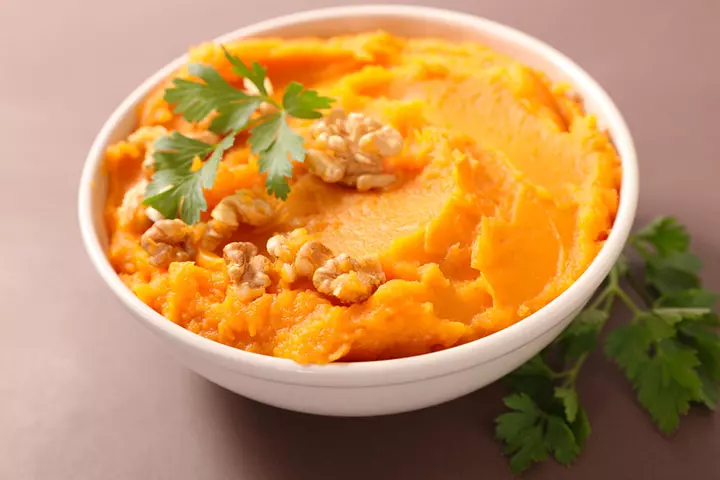
You can combine sweet potatoes with carrots to make a sweet and healthy delight for the baby.
You will need:
- 3-4 cups of chopped sweet potatoes
- 3-4 cups of chopped carrots
- 4-5 cups of water
How to:
- Boil or steam the sweet potatoes and carrots separately until they are tender.
- Transfer the carrots and sweet potatoes in the blender and blend to the desired consistency. If your baby has a sweet tooth, then you can add more sweet potatoes than carrots.
 Quick tip
Quick tip4. Carrot rice:
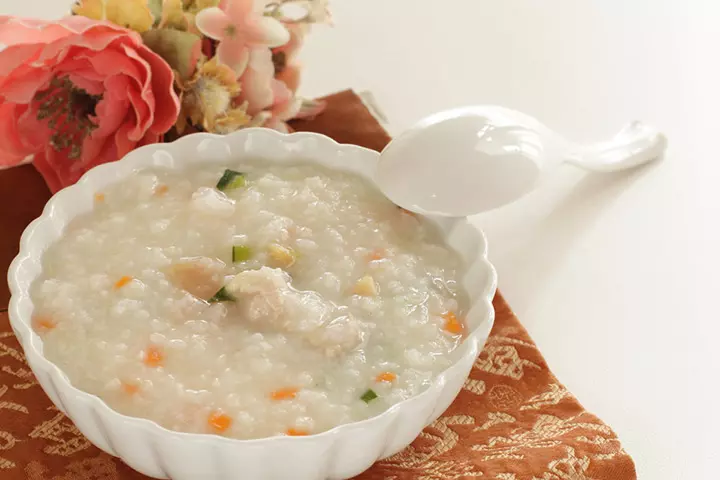
This is a nutritious baby food, for lunch or dinner.
You will need:
- 3-4 cups of diced carrots
- 6-7 cups of rice
- 9-10 cups of water
How to:
- Cook rice with diced carrots in a pot for 20-25 minutes.
- You can also cook them in a pressure cooker.
- Cook till rice and carrots are soft, which makes it easy for the baby to eat. Mix the carrot and rice well before serving. You could add more water if the mixture is thick.
5. Carrot and parsnip puree:
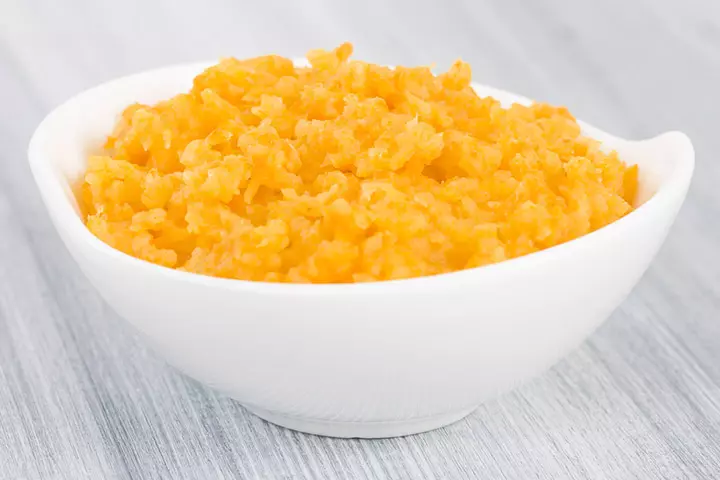
Parsnip is a root vegetable like carrot, and the two get along quite well when cooked for baby food.
You will need:
- 3 cups of diced parsnip
- 3 cups of diced carrots
- 4-5 cups of water
How to:
- Boil or steam parsnip and carrots together since they take the same time to cook.
- Transfer the cooked vegetables to a blender and blend them until desired consistency. In case you steamed the vegetables then you can add warm water separately when blending.
6. Peas and carrot puree:
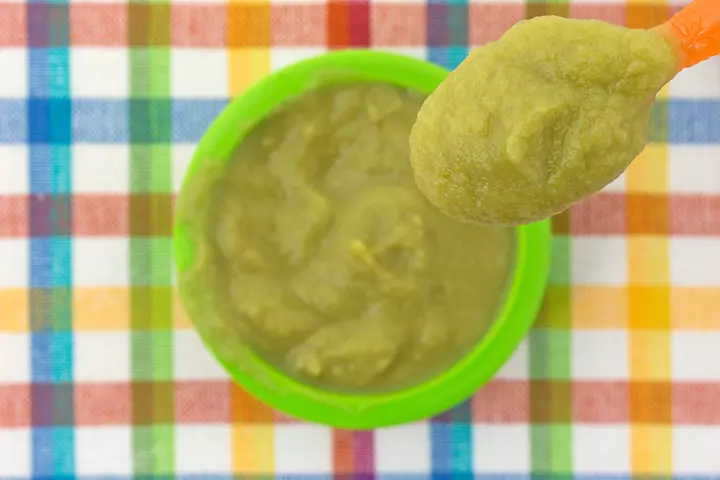
Peas taste delicious with carrots, and your baby is going to love this combination.
You will need:
- 2 cups peas
- 2 cups diced carrots
- 4-5 cups of water
How to:
- Boil the peas while you have the choice to steam or boil the carrots. For faster cooking, you can boil carrots and peas together.
- Transfer the cooked vegetables to a blender and puree them.
7. Carrot and chicken puree:

This is a delicious mix of meat and vegetables to make a healthy baby food recipe.
You will need:
- 2 cups chopped boneless chicken
- 2 cups diced carrots
- 6-7 cups of water
How to:
- Boil the chicken and carrots separately until tender. Retain the chicken stock since it can be used in the blending process.
- Transfer chicken, carrots, and stock into a blender and blend them. Add warm water to thin the consistency, if needed.
- You can blend into a thinner consistency for younger babies.
8. Cooked carrot sticks:
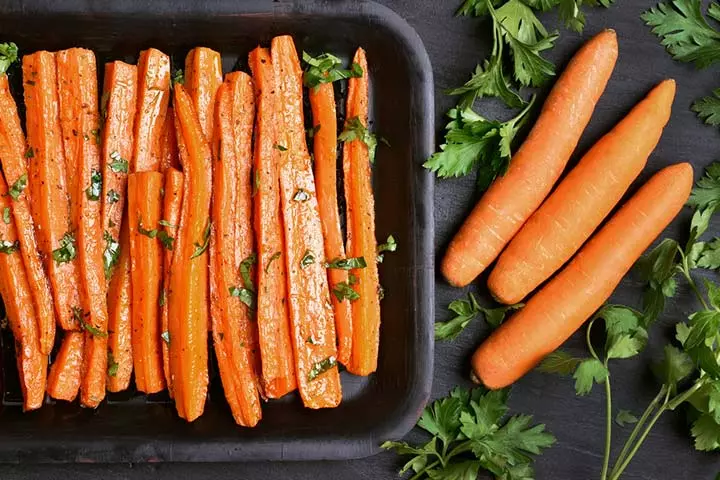
If the baby is a full-fledged finger food muncher, then he will love eating cooked carrot sticks as a snack.
You will need:
- 6-7 carrots
How to:
- Cut the carrot lengthwise with each carrot cut into three to four sticks.
- Carrot sticks can be cooked in multiple ways. Steam, bake, or keep them crunchy for older infants.
9. Apple, carrot, and onion soup:
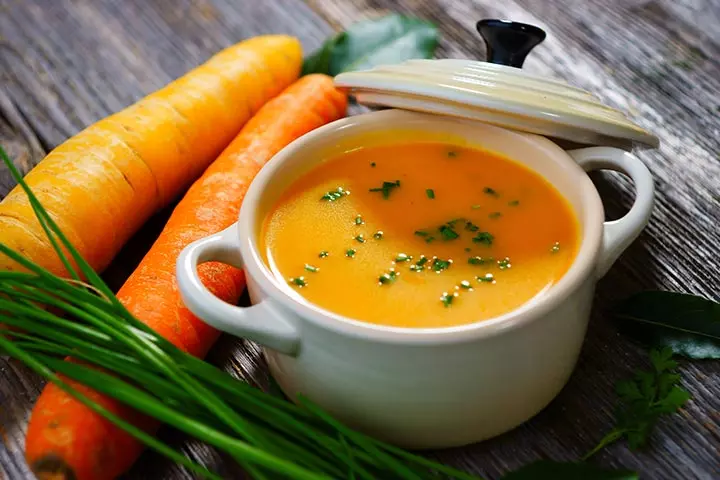
Apples add a punch of sweetness, while onions give a nice flavor to the carrot soup.
You will need:
- 4-5 cups diced apples (without peels)
- 3 cups diced carrots
- 1-2 cups finely chopped onions
- 9-10 cups of water
How to:
- Boil the apples separately and the onions and carrots together.
- Bring all the ingredients together and blend. You can use some extra warm water to blend better. Since it is soup, blend for longer to get a thinner consistency. You can make a carrot and apple puree the same way by using less water and removing onions from the ingredients.
10. Carrot-beetroot soup:
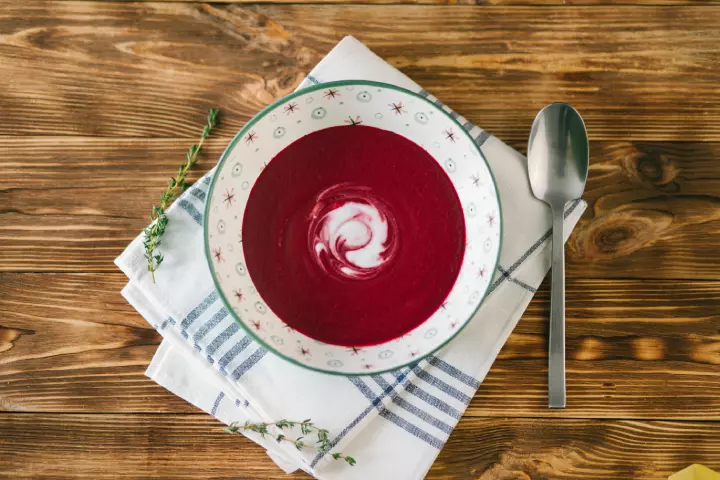
Beetroot adds to the sweetness of carrots and imparts an attractive deep purple color to the soup.
You will need:
- 1 small beetroot
- 1 carrot
- ½ cup water
- 1tsp butter
How to:
- Wash, peel and chop the carrot and beetroot.
- Pressure cook or steam cook the vegetables until soft.
- Cool and blend to a smooth puree.
- Add warm water to adjust consistency.
- Add butter and serve warm.
11. Carrot oats porridge:
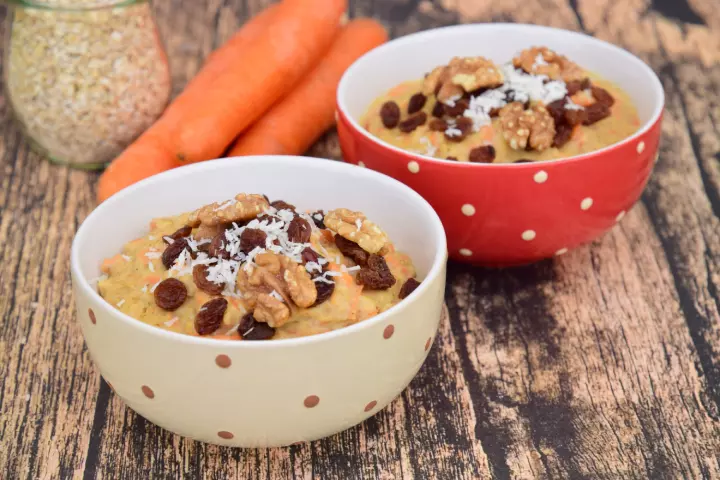
Here’s one of the most delectable carrot recipes for toddlers. It contains the goodness of oats and can be served to babies over eight months.
You will need:
- ¼ cup oatmeal (powdered oats)
- ½ cup carrots (sliced)
- 1 cup water
- 2 dates (presoaked in warm water)
- 1tsp nut powder (optional)
- ¼ cup breast milk or prepared formula milk
How to:
- Pressure cook the carrots till soft.
- Blend carrots and dates to a smooth paste.
- Mix oats in a cup of water and add to a pan placed on medium heat.
- Cook with continuous stirring for three to five minutes.
- Add the carrot date puree and nut powder and mix well.
- Remove from heat and stir in the breast milk/formula
- Serve warm
12. Carrot milkshake:
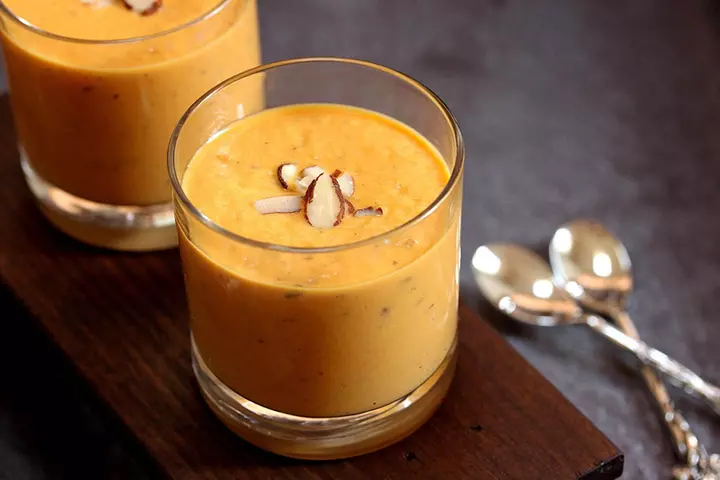
This is a delicious dessert for babies older than 12 months when they begin drinking cow milk.
You will need:
- 4 cups diced carrots
- 6-7 cups of cow’s milk
- 1 tablespoon sugar
How to:
- Boil cow milk, sugar, and diced carrots for 15-20 minutes on a low flame.
- Cool the mixture and blend for the required consistency and serve.
13. Carrot juice:

Juice is made from raw vegetables, and raw carrots are not suitable for young infants. Therefore, wait until the baby is 12 months before you introduce carrot juice.
You will need:
- 2-3 carrots
- 1 cup water (optional)
How to:
- Wash the carrots thoroughly and chop them into discs.
- Extract the juice and depending on your baby’s preference you may add a cup of water to thin its consistency.
These recipes are easy-to-cook and straightforward. You can try other carrot baby food variations since carrots go well with several types of food.
Carrot Baby Food Combinations
You can combine the following foods with carrots:
- Vegetables: Combine carrots with any vegetable of your choice! Sky’s the limit!
- Grains and lentils: You can cook the root vegetable with grains such as rice, wheat, and lentils. Carrots also go well with all types of lentils.
- Meat: Make delicious meat purees by adding carrot to it.
- Fruits: There are not many fruits that can be combined with carrots, and the best combination is apples and peaches.
Frequently Asked Questions
1. Can carrots be given to babies every day?
Children aged one to four years can have about two to six carrot sticks or one to three tablespoons of carrots in one or two servings per day (6).
2. Do carrots cause constipation in babies?
No, carrots are among the moderately fibrous foods recommended for managing constipation (7).
3. Can carrots upset my baby’s stomach?
If your baby is allergic to carrots, their body may react negatively to the allergen present in the carrots, which can manifest in physical symptoms such as indigestion, vomiting, nausea, bloating, and diarrhea (11).
4. How common is carrot allergy in babies?
Carrot allergy affects approximately 10% of individuals with food allergies and is the third most common allergen to cause systemic reactions (12).
5. Do baby carrots have more sugar than regular carrots?
Both baby carrots and carrots have a similar amount of sugar, with baby carrots containing 4.8 grams of sugar per 100 grams and regular carrots containing 4.7 grams per 100 grams (13).
Carrot is an excellent source of nutrients for babies. It contains vitamin A, useful for improving vision, and flavonoids to boost immunity and heart health. Carrots may be introduced to babies after six months in well-cooked form. Carrot recipes for babies include steaming, boiling, baking, or roasting them for ease of consumption. You can also make carrot juice, soups, and milkshakes. They can be pureed alone or mixed with other vegetables for babies such as potato, peas, sweet potato, or parsnip. Carrots may also be combined with rice or chicken. Try these tasty and healthy carrot recipes and introduce your baby to more taste options.
Infographic: Health Benefits Of Carrots For Babies
Carrots are a rich source of vitamins and essential micronutrients. Including this vegetable in your baby’s diet can help their growth and development. To add to the list of carrots’ benefits for babies, we have prepared this infographic for you.
Some thing wrong with infographic shortcode. please verify shortcode syntax
Illustration: Carrot For Babies: 11+ Nutritious And Easy-To-Make Recipes
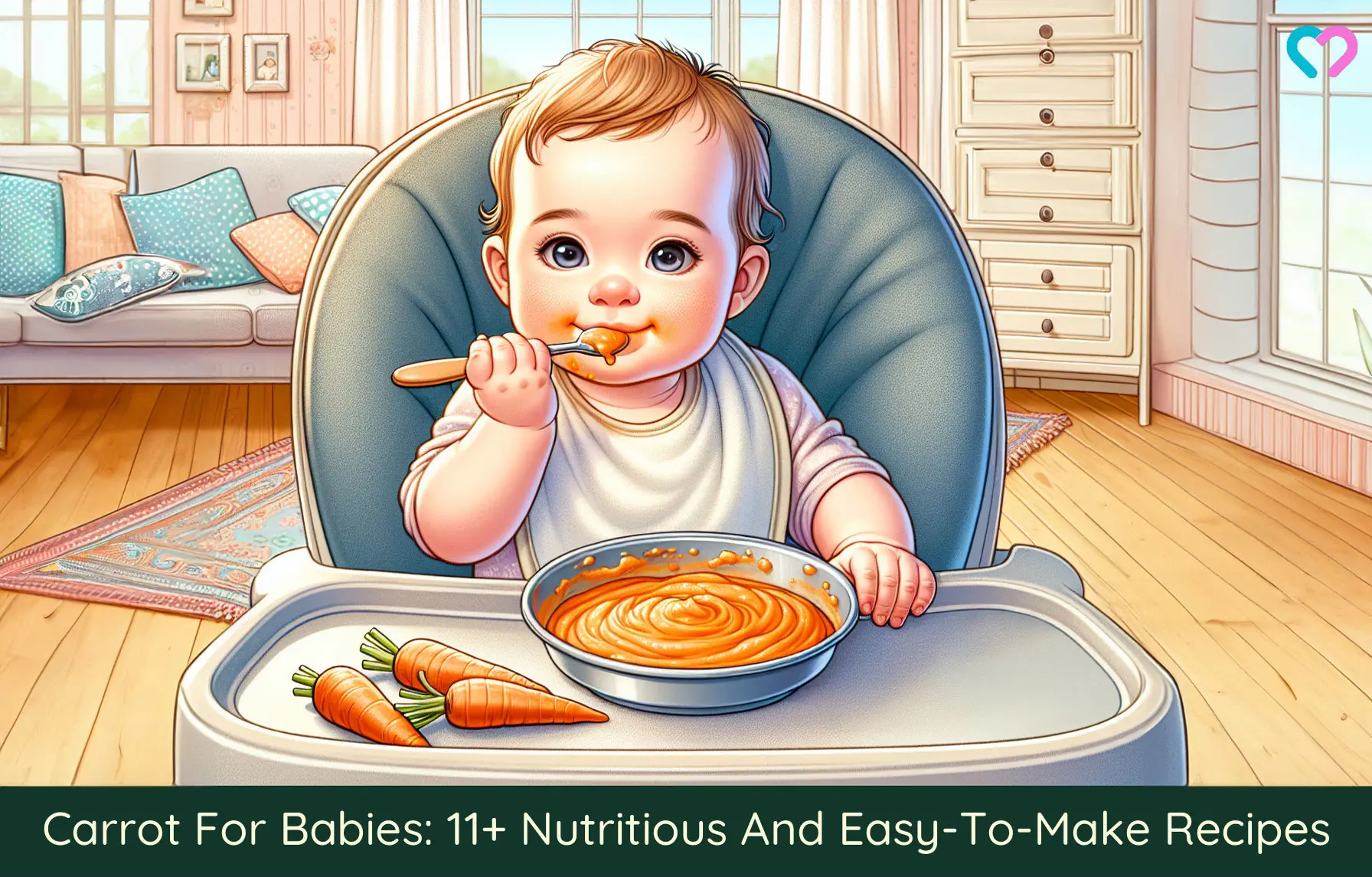
Image: Dall·E/MomJunction Design Team
Watch this video on how to make a delicious and nutritious Carrot & Potato Puree for your baby. Quick and easy to make, perfect for your little one!
References
- CPMC Food Allergy Care.
https://www.sutterhealth.org/cpmc/services/allergy/food-allergy - AAP Clinical Report on Infant Methemoglobinemia.
https://www.aafp.org/pubs/afp/issues/2005/1215/p2558.html - João Carlos da Silva Dias; (2014); Nutritional and Health Benefits of Carrots and Their Seed Extracts.
https://file.scirp.org/pdf/FNS_2014120411490798.pdf - Carrots, raw.
https://fdc.nal.usda.gov/fdc-app.html#/food-details/170393/nutrients - Bleach on carrots? Consumer question answered.
https://www.bestfoodfacts.org/bleachoncarrots/ - PORTION SIZES FOR CHILDREN 1-4 YEARS.
https://infantandtoddlerforum.org/media/upload/pdf-downloads/1.3_-_Portion_Sizes_for_Children_1-4_Years.pdf - Constipation.
https://www.urmc.rochester.edu/encyclopedia/content.aspx?contenttypeid=90&contentid=P01986 - Homemade Baby Food: The Danger of Nitrates.
https://www.nationwidechildrens.org/family-resources-education/700childrens/2014/06/homemade-baby-food-the-danger-of-nitrates - Hamzeh Salehzadeh et al.; (2025); The nitrate content of fresh and cooked vegetables and their health-related risks.
https://journals.plos.org/plosone/article?id=10.1371/journal.pone.0227551 - Vitamin A and Carotenoids.
https://ods.od.nih.gov/factsheets/VitaminA-HealthProfessional/ - Organic vs. Non-Organic Carrots – Which Are Better?
https://www.healwithfood.org/safety-concerns/organic-carrots-nitrate-levels.php
Community Experiences
Join the conversation and become a part of our nurturing community! Share your stories, experiences, and insights to connect with fellow parents.
Read full bio of Dr. Shikha Sharma
Read full bio of Rohit Garoo
Read full bio of Swati Patwal
Read full bio of Vidya Tadapatri

 Did you know?
Did you know?



